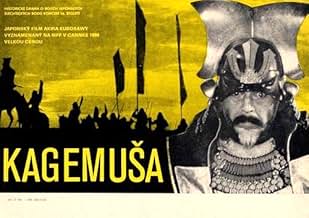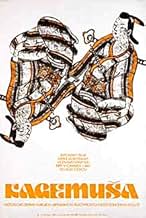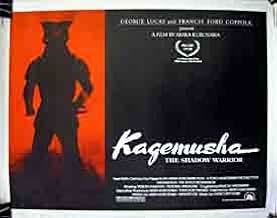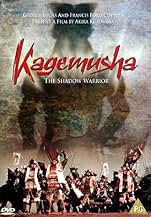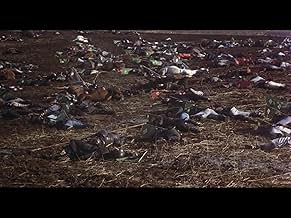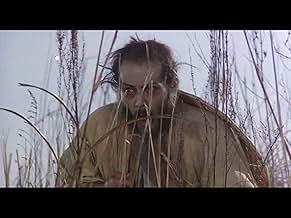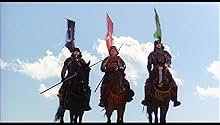AVALIAÇÃO DA IMDb
7,9/10
40 mil
SUA AVALIAÇÃO
Um pequeno ladrão com uma forte semelhança com um senhor da guerra samurai é contratado como um duplo do senhor. Quando ele morre, o ladrão é forçado a pegar em armas em seu lugar.Um pequeno ladrão com uma forte semelhança com um senhor da guerra samurai é contratado como um duplo do senhor. Quando ele morre, o ladrão é forçado a pegar em armas em seu lugar.Um pequeno ladrão com uma forte semelhança com um senhor da guerra samurai é contratado como um duplo do senhor. Quando ele morre, o ladrão é forçado a pegar em armas em seu lugar.
- Direção
- Roteiristas
- Artistas
- Indicado a 2 Oscars
- 20 vitórias e 5 indicações no total
- Direção
- Roteiristas
- Elenco e equipe completos
- Produção, bilheteria e muito mais no IMDbPro
Avaliações em destaque
This film is one of Kurosawa's masterpieces and gives an profound insight in the pre-Tokugawa period of Japan. Especially remarkable is the very elaborated atmosphere of this film to which contribute the pure and simple dialogues and the use of very well-made sceneries. Kurosawa's favorite actor Tatsuya Nakadai is here at his best. Although the atmosphere is very elaborated and almost perfectly historic; tension of the viewer is heightened by the simplicity of the scenes. Kurosawa leaves certain parts to the viewer's imagination rather than showing it. The movie is highly philosophical as well as emotionally touching and presents the soul of the way of samurai and Japan's old samurai system much better and more serious than countless cheap- and bad-made martial arts movies about samurai. This is a warning to all who expect fast martial arts action and blood covered katana. This film is a Kurosawa-style mixture between opulent costume- drama, a philosophic and tragic story and the sensitivity only Kurosawa has displaying Japan's traditional way-of-life.
10Hitchcoc
This is a great epic of war and a film of great emotion. At the center is a man who has nothing. He is thrust into a world he didn't create. He is a petty thief and really would like to just get on with his life. What he also has is great loyalty to his now deceased lord, and despite his great concern for his ability to carry it off, he agrees to the position. He has to know that at some point this will all come crashing down. The Samurai code makes it so that he has few options. He runs the war the best he can but occasionally falls victim to who he is. Even with advisers watching his every move, he becomes so much a part of the entire picture that he is left to destroy himself, and, in the process, the clan that he represents. The battle scenes are remindful of the other huge films like "Ran" and "Throne of Blood." They sweep across the screen with the flag carrying horsemen and the infantry fighting until there is nothing left but total carnage. Because of the complexity of the story and the wonderful acting, I would put this at or near the top of my Kurosawa list.
10george-b
I am a fan of Kurosawa and have seen many of his films many times. There is a sweep and an ache to Kagemusha that is genuine and has remained in my heart's memory. Unlike Ran, it is not Shakespearean. Unlike Seven Samurai, my favorite all-time film and I believe the best film ever made, it is not a western.
Although epic, it is about a sweet and rueful soul swallowed by karma and history. It is redemptive without overt sentiment, and the lead performance by Tatsuya Nakadai is nuanced and unforgettable.
I will always remember this film, not for its complexity or savagery, but for the simplest moments between Lord and subject, between the highest self and the lowest self, and most particularly, the very real pain of a man caught in the vise of his own life and death.
Although epic, it is about a sweet and rueful soul swallowed by karma and history. It is redemptive without overt sentiment, and the lead performance by Tatsuya Nakadai is nuanced and unforgettable.
I will always remember this film, not for its complexity or savagery, but for the simplest moments between Lord and subject, between the highest self and the lowest self, and most particularly, the very real pain of a man caught in the vise of his own life and death.
What happens to the doppelganger when the original dies? Does he flitter out of existence or does he find his own. Kagemusha (shadow warrior in Japanese) is the story of a thief who is to be hanged, but is saved by a warlord's brother, Katsuyori Takeda, because of a peculiar resemblance to the king Shingen Takeda. Tatsuya Nakadai brilliantly plays both roles of Shingen and the thief. The thief is trained to fill in as Shingen's double, a position previously played by his brother Katsuyori. Shingen receives a mortal wound during a siege and the Takeda Clan retreat. His dying wish is that he wants his death not to be known for at least three years. Kagemusha eventually acquiesces to the role of not just doubling for the king, but being a figurehead twenty-four hours a day.
The intimate circle of Shingen's family and guard knows about the double. They advise him about how to be like Shingen. He plays the part well. Shingen's son Nobukado, who knows that he is the double, is convinced that his father did this to spite him. Nobukado was passed over as king and that position was granted to Shingen's grandson and Nobukado's son Takemaru as soon as he reaches of mature age. Later in the film, we realize that Shingen did this because Nobukado is too aggressive and is not leader material, not to spite him. The backing of Kagemusha helped Nobukado's one great military victory. Nobukado would forever be in Shingen's shadow.
The relationships between the thief and the Lord's men make this a fascinating film. There is a rich tapestry of multidimensional characters. To some critics the action was too slow. It was not as fast paced as The Seven Samurai or Yojimbo. I think it is a mature film from a maturing director who would go on to direct another of my favorite films Ran. This film was nominated for two academy awards and would co-win the grand prize at the Cannes Film Festival. The juxtaposition between the titanic and minute is a favorite concept of Kurosawa. Stolid men have tragic faults. Beggars can be kings.
Kurosawa is one of the world's most famous directors. Yet in the 1980's, he did not get much respect from his home country Japan. He had not had released a film since 1975 -- the beautiful and brilliant Dersu Uzala and he was reportedly suicidal. This film would not have been made if it were not for George Lucas and Francis Ford Coppola whom helped finance this film. Lucas has always been a big fan of Kurosawa. Star Wars was partially influenced by Kurosawa's film The Hidden Fortress. I am a big fan of Kurosawa too. His films always have the most beautiful cinematography, intricate plots and grand characters. Kagemusha is no exception.
The intimate circle of Shingen's family and guard knows about the double. They advise him about how to be like Shingen. He plays the part well. Shingen's son Nobukado, who knows that he is the double, is convinced that his father did this to spite him. Nobukado was passed over as king and that position was granted to Shingen's grandson and Nobukado's son Takemaru as soon as he reaches of mature age. Later in the film, we realize that Shingen did this because Nobukado is too aggressive and is not leader material, not to spite him. The backing of Kagemusha helped Nobukado's one great military victory. Nobukado would forever be in Shingen's shadow.
The relationships between the thief and the Lord's men make this a fascinating film. There is a rich tapestry of multidimensional characters. To some critics the action was too slow. It was not as fast paced as The Seven Samurai or Yojimbo. I think it is a mature film from a maturing director who would go on to direct another of my favorite films Ran. This film was nominated for two academy awards and would co-win the grand prize at the Cannes Film Festival. The juxtaposition between the titanic and minute is a favorite concept of Kurosawa. Stolid men have tragic faults. Beggars can be kings.
Kurosawa is one of the world's most famous directors. Yet in the 1980's, he did not get much respect from his home country Japan. He had not had released a film since 1975 -- the beautiful and brilliant Dersu Uzala and he was reportedly suicidal. This film would not have been made if it were not for George Lucas and Francis Ford Coppola whom helped finance this film. Lucas has always been a big fan of Kurosawa. Star Wars was partially influenced by Kurosawa's film The Hidden Fortress. I am a big fan of Kurosawa too. His films always have the most beautiful cinematography, intricate plots and grand characters. Kagemusha is no exception.
I saw the director's cut about twenty years after I first saw the film. Kagemusha is as magnificent now as before, but what has changed in the meantime is my appreciation of the meaning of Shakespeare's plays. The history plays and most of the tragedies were about the political dilemmas facing the new Tudor state. The Elizabethan audience sat on the edge of their seats waiting to see how political order might be restored once it had been set in disarray. The Wars of the Roses sequence culminates in the late political tragedies -- Julius Caesar, Macbeth, Hamlet and Lear. The question is always the same. How is an impersonal modern state possible when its leader is a person, the King? Or is rule by office compatible with the human flaws of the person occupying it? Shakespeare was the client of a conservative aristocratic faction, no rabble-rousing democrat he. But he went so deep into this political question in the course of writing all his plays that he dug deeper into this core issue of modern politics than anyone since.
Kurosawa approaches the same question through the notion of a double,"the shadow of a warrior", Kagemusha. Here the contrast between the office of the political leader and its personal incumbent is brought vividly to life in so many ways. The period is the Japanese equivalent of England's War of the Roses, the transition from feudalism to the beginnings of the modern state. The losing side in this case is the one that tries to resolve the contradiction of personality and office by a subterfuge, a thief masquerading as a lord. The winning side and founder of the Japanese state is the Tokugawa clan. The climactic battle symbolises the passage from traditional to modern warfare, as the horses of the losers are mown down by fusillades of gunfire. The credits run as the corpse of the double crosses a submerged flag whose abstract symbolism shows us which aspects of feudalism the modern state will borrow. Personality is vanquished.
The aesthetic vision animating this movie is incredible. There is so much to look at and admire, perhaps interpret. One striking feature for me was the persistent strong breeze ripping through the banners, a symbol of the winds of change running through 16th century Japan, contemporary to Shakespeare's period. Because this drama was made by and for the modern cinema, in many ways Kurosawa's masterpiece is better than Shakespeare.
Kurosawa approaches the same question through the notion of a double,"the shadow of a warrior", Kagemusha. Here the contrast between the office of the political leader and its personal incumbent is brought vividly to life in so many ways. The period is the Japanese equivalent of England's War of the Roses, the transition from feudalism to the beginnings of the modern state. The losing side in this case is the one that tries to resolve the contradiction of personality and office by a subterfuge, a thief masquerading as a lord. The winning side and founder of the Japanese state is the Tokugawa clan. The climactic battle symbolises the passage from traditional to modern warfare, as the horses of the losers are mown down by fusillades of gunfire. The credits run as the corpse of the double crosses a submerged flag whose abstract symbolism shows us which aspects of feudalism the modern state will borrow. Personality is vanquished.
The aesthetic vision animating this movie is incredible. There is so much to look at and admire, perhaps interpret. One striking feature for me was the persistent strong breeze ripping through the banners, a symbol of the winds of change running through 16th century Japan, contemporary to Shakespeare's period. Because this drama was made by and for the modern cinema, in many ways Kurosawa's masterpiece is better than Shakespeare.
Você sabia?
- CuriosidadesMuch of the film recounts actual historical events, including Shingen's death and the two-year secret, and the climactic Battle of Nagashino in 1575. Those scenes are also modeled closely on detailed accounts of the battle.
- Erros de gravaçãoIn the final battle there are at least 100 riflemen shown firing their matchlock rifles in volleys. The smoke generated by the matchlocks almost immediately dissipates. This indicates a more modern gunpowder was used in the matchlocks as the historically correct black powder load would blanket the battlefield with thick smoke after a handful of volleys.
- Citações
Nobukado Takeda: The shadow of a man can never stand up and walk on its own.
- Versões alternativasIn the original Japanese version, there are 20 minutes featuring Kenshin Uesugi. For some reason, these scenes were cut out of the USA version.
Principais escolhas
Faça login para avaliar e ver a lista de recomendações personalizadas
Detalhes
- Data de lançamento
- Países de origem
- Idioma
- Também conhecido como
- Kagemusha: The Shadow Warrior
- Locações de filme
- Himeji Castle, Himeji, Japão(Nobunaga's castle)
- Empresas de produção
- Consulte mais créditos da empresa na IMDbPro
Bilheteria
- Orçamento
- US$ 6.000.000 (estimativa)
- Faturamento bruto nos EUA e Canadá
- US$ 4.000.000
- Faturamento bruto mundial
- US$ 4.018.532
- Tempo de duração
- 3 h(180 min)
- Cor
- Mixagem de som
- 4-Track Stereo(original version)
- Proporção
- 1.85 : 1
Contribua para esta página
Sugerir uma alteração ou adicionar conteúdo ausente


